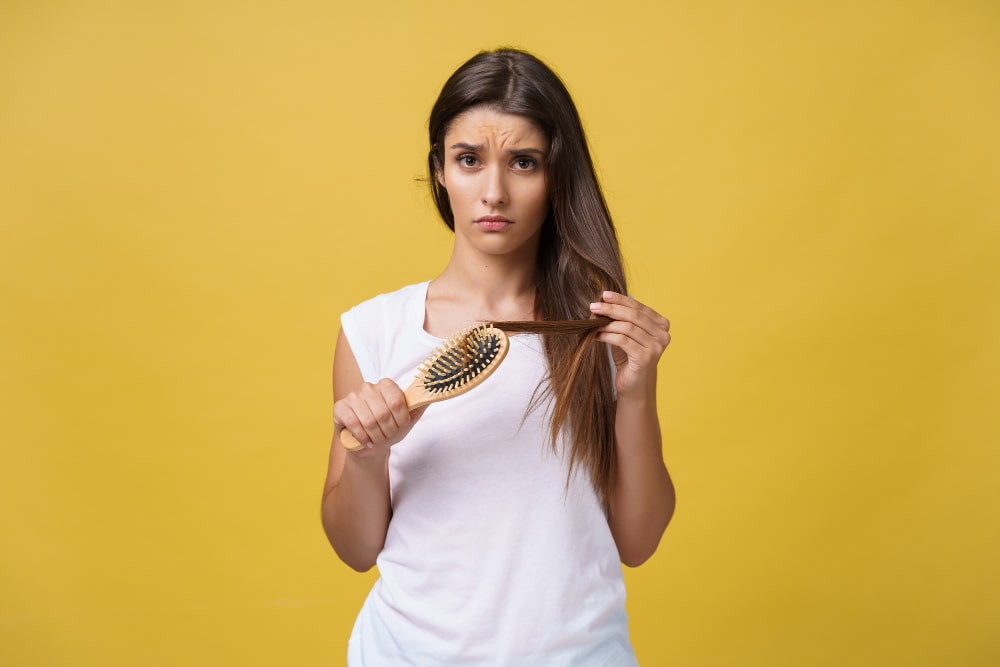Vitamin D is a crucial component of good health, and it plays an important role in hair growth and maintenance. Studies have shown that low levels of Vitamin D can lead to various forms of hair loss, including alopecia areata, telogen effluvium, and male pattern baldness. In this article, we’ll explore can low vitamin d cause hair loss, the connection between Vitamin D and hair loss and discuss how you can maintain healthy Vitamin D levels through lifestyle changes and supplements.
Understanding the Role of Vitamin D
Vitamin D is an important nutrient for overall health and wellness. It plays a role in bone strength, heart health, immune system function, and more. Some studies suggest that it can also be beneficial for hair health. The body needs vitamin D to help absorb calcium and phosphorus, both necessary nutrients for healthy hair. Vitamin D also helps regulate cell growth in the scalp, which can affect how fast and strong your hair grows.
The Link Between Vitamin D and Hair Health
Research suggests that vitamin D may be linked to hair health. Low levels of vitamin D have been associated with conditions such as alopecia areata (an autoimmune disorder causing hair loss) and telogen effluvium (a form of temporary hair loss caused by an underlying medical condition). In addition, some studies suggest that vitamin D plays a role in producing keratin, a protein found in hair.
Read More: Can Wearing a Hat Cause Hair Loss: Everything You Need to Know
Vitamin D Deficiency and Hair Loss
Vitamin D deficiency can have a negative impact on your overall health and may cause to hair loss. In cases of alopecia areata, low levels of vitamin D have been linked to increased severity of the condition. Vitamin D deficiency can also cause telogen effluvium, temporary hair loss due to an underlying medical condition or stress.
The Mechanism Behind the Connection
The mechanism behind the link between vitamin D deficiency and hair loss has yet to be fully understood. Low vitamin D levels may affect cell growth in the scalp, leading to slower and weaker hair growth. Research also suggests that vitamin D helps regulate keratin production, which can affect the strength and resilience of your hair.
Studies and Scientific Evidence
There have been several studies exploring the link between vitamin D deficiency and hair loss. One study found that low levels of vitamin D were associated with an increased risk of alopecia areata. Another study concluded that there was a correlation between low levels of vitamin D and telogen effluvium. These findings suggest that maintaining healthy levels of vitamin D could help reduce the risk of hair loss.
Read More: Foods That Cause Hair Loss: Everything You Need to Know
Other Factors Influencing Hair Loss
It is important to keep in mind that there are other factors that can influence hair loss, including;
Genetics: Hair loss can cause by hereditary factors, such as male-pattern baldness.
Lifestyle: Certain lifestyle choices, such as smoking, using harsh chemical treatments on the hair, or not eating a balanced diet, can all lead to hair loss.
Hormones: Hormonal imbalances, such as those experienced during pregnancy or menopause, can cause hair loss.
Medications: Certain medications, such as those used to treat cancer or heart disease, may cause hair loss.
Medical Conditions: Medical conditions like thyroid issues and lupus can lead to hair loss.

Read More: Can Creatine Cause Hair Loss? Understanding the Connection
Symptoms of Vitamin D Deficiency
The symptoms of vitamin D deficiency vary from person to person and can include
- Fatigue
- Bone and muscle pain
- The weakened immune system
- Depression and stress
- Hair loss
If you are deficient in vitamin D, it is important to talk to your healthcare provider about testing and treatment options.
How to Maintain Healthy Vitamin D Levels?
You can maintain healthy levels of vitamin D by getting regular exposure to sunlight, eating a balanced diet, and taking supplements if necessary. The best source of vitamin D is natural sunlight, so it is important to get at least 15 minutes of direct sunlight per day (with sunscreen).
A balanced diet that includes foods high in vitamin D, such as fatty fish, egg yolks, and fortified dairy products, can also help maintain healthy nutrient levels. If necessary, your healthcare provider may suggest taking a supplement to make up for any deficiencies.
Read More: Does Diabetes Cause Hair Loss: Exploring the Connection
Are there any lifestyle changes I can make to promote healthy hair?
In addition to getting enough vitamin D and eating a balanced diet, there are other lifestyle changes you can make to promote healthy hair. Reducing stress levels, limiting the use of harsh chemical treatments on the hair, and avoiding tight hairstyles that pull on the scalp can help maintain a healthy head of hair. In addition, regular exercise can increase blood flow to the scalp and promote healthier hair growth.
Vitamin D Supplements for Hair Loss
If you are deficient in vitamin D, your healthcare provider may suggest a supplement. While the evidence on whether supplements can help with hair loss is still limited, some studies have indicated that it may be beneficial. Talk to your healthcare provider about the best supplement options for your needs and lifestyle.
Read More: Can Low Calcium Cause Hair Loss? Everything You Need to Know
Does low vitamin d3 cause hair loss?
Low levels of vitamin D3 can contribute to hair loss. Vitamin D3 is an active form of vitamin D that helps regulate hormones and maintain healthy hair follicles. Low levels can lead to weakened hair follicles and slow the growth rate of new hairs. Eating a balanced diet with foods high in vitamin D3, getting regular exposure to sunlight, and taking supplements if necessary can help maintain healthy levels and reduce the risk of further hair loss.
If you are experiencing prolonged or severe hair loss, it is important to consult a healthcare professional for an accurate diagnosis and treatment plan. They may suggest additional testing such as blood work to determine if there is a vitamin D deficiency or other underlying condition. With the right care and dedication, you can help ensure your hair stays strong and healthy.
What other conditions can cause hair loss?
In addition to low levels of vitamin D, other conditions can contribute to hair loss, such as hormonal imbalances, thyroid disorders, and certain medical conditions. Stress and a poor diet can also lead to hair loss. If you are experiencing prolonged or severe hair loss, it is best to consult a healthcare professional for an accurate diagnosis and treatment plan. They may suggest additional tests to determine if there is an underlying condition causing the hair loss.
Read More: Lack of Sleep Cause Hair Loss : Tips For Better Sleep Habits
Diet Changes to Promote Hair Health
In addition to taking a supplement if necessary, you can make diet changes to promote healthy hair. Eating a balanced diet that includes foods high in protein, omega-3 fatty acids, zinc, and iron can help maintain healthy hair. Foods such as salmon, eggs, nuts and seeds, dark leafy greens, and avocados are all good sources of these nutrients. Additionally, limiting your intake of processed foods and refined sugars can help with promoting healthy hair growth.
Consult a Healthcare Professional
It is important to remember that each person’s hair loss needs and health status are unique. If you are experiencing prolonged or severe hair loss, it is best to consult a healthcare professional for an accurate diagnosis and treatment plan. They may suggest additional testing such as blood work to determine if there is a vitamin D deficiency or other underlying condition.
With the help of your healthcare provider, you can develop a treatment plan that is tailored to your needs and lifestyle. This may include diet and lifestyle changes and taking vitamin D supplements if necessary. Making these adjustments to your daily routine can help restore the health of your hair and reduce the risk of future hair loss. With the right care and dedication, you can help ensure your hair stays strong and healthy.
Read More: Can Selenium Cause Hair Loss : Everything You Need To Know
Conclusion
In conclusion, there is evidence that suggests a link between vitamin D deficiency and hair loss. Maintaining healthy levels of vitamin D can help reduce the risk of further hair loss. In addition to getting enough sunlight exposure, taking supplements if necessary, and eating a balanced diet with foods high in vitamin D, other lifestyle changes such as reducing stress levels and avoiding harsh chemical treatments can also promote healthy hair. If you are experiencing prolonged or severe hair loss, it is important to consult a healthcare professional for an accurate diagnosis and treatment plan that is tailored to your individual needs. With the right care and dedication, you can help ensure your hair stays strong and healthy.
FAQs
Yes, low levels of vitamin D can contribute to hair thinning. Low vitamin D levels can lead to weakened hair follicles and slow the growth rate of new hairs. Eating a balanced diet that includes foods high in vitamin D, getting regular exposure to sunlight, and taking supplements if necessary may help with maintaining healthy levels of vitamin D and promoting thicker hair.
Low levels of vitamin D can potentially increase the risk of developing high blood sugar. Vitamin D plays an important role in the regulation of insulin, and low levels may lead to increased blood sugar levels. Additionally, some research suggests vitamin D supplements help reduce blood glucose levels. However, it is best to consult a healthcare professional before beginning any supplement regimen.
Yes, vitamin D deficiency can cause hair loss in children. Symptoms of a vitamin D deficiency, such as fatigue, weakened immune system, and bone and muscle pain, can cause to hair loss. In addition, low levels of vitamin D can affect the growth rate of new hairs and contribute to thinning hair.
Yes, vitamin D can be taken orally in the form of a supplement. Talk to your healthcare provider about the best supplement option for your needs and lifestyle. They may suggest taking an over-the-counter vitamin D supplement or prescribing a higher dose if necessary. It is important to ensure that you are taking the correct dose and following the instructions on the label carefully. Taking too much vitamin D can lead to serious health complications.

